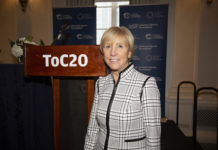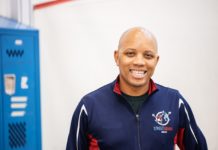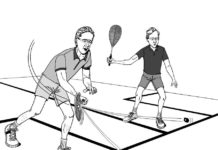By Rob Dinerman
Whitewashed through the first 11 points against the recently- ensconced U. S. National Hardball champion, Chris Walker weathered that severe early storm and eventually retrieved and powered his way to a 3-15 15-5 16-14 10-15 15-12 victory over top seed Preston Quick in the final of the $7500 Players Championship Hardball Singles Invitational before a packed and enthralled gallery at the University Club of New York on a torrid Monday evening in mid-April. This eight-man tournament, played with the green Astral ball on an international- sized court (30 inches wider and hence 80 square feet bigger than a regulation hardball court and with the two-incheshigher softball tin and softball boundary-line markings), was held as part of the $30,000 Players Championship pro doubles event, the last ranking stop on the 2010-11 ISDA pro doubles tour. It was inspired, at least in part, by the dominant performance of the ISDA player group in February’s U. S. Hardball Nationals in Boston, where Quick, Dan Roberts and James Hewitt captured the Open, 25-and-over and 40-and-over flights respectively, which motivated the Hardball Committee to fund this follow-up tourney, hopefully the first of many to occur in conjunction with ISDA events next season.
If so, future such tournaments will be hard-pressed to match the intensity and athleticism that characterized this 80-minute Walker-Quick battle, which kicked off a wildly entertaining evening at the host venue that would feature a five-game women’s pro doubles final—in which Narelle Krizek and Suzie Pierrepont won the last 10 points from 5-all in the fifth against their Turner Cup final-round conquerors Natalie Grainger and Amanda Sobhy—and the men’s pro doubles final, which saw Ben Gould and Damien Mudge complete an undefeated wire-to-wire season-long slate with a ferocious straight-game win over Clive Leach and Matt Jenson.
 Quick endured several tight moments in his pair of pre-final victories (losing the third game and winning a one-point fourth in his quarterfinal with Yvain Badan, before rallying from 14-9 down in the close-out third game of his semifinal win over Mark Chaloner), but, he was on fire as he burst out of the gate against Walker, who after that disastrous first game made adjustments both tangible (switching from his softball racquet to his doubles racquet to get greater pace with his drives) and tactical, becoming more aggressive and steering most of the play to the left wall, where his southpaw forehand power would jar Quick out of the comfort zone he had established. The latter, by his own rueful postmatch admission, eased up a bit after his onesided opening-game score and promptly fell way behind in the second— but after those two evenly-divided pair of games, both players settled down and the three tight games that followed were brutally hard fought and airtight all the way through. Unsurprisingly, both players were at their most effective when the action took place on the walls on which they are positioned on their respective doubles teams: Quick has played the right wall throughout his highly productive five-year alliance with John Russell (14 ISDA finals, including winning the 2007 U. S. National Doubles), while Walker with right-wall partner Chaloner reached the finals this past season in both Wilmington and Brooklyn, losing only once to any team other than Mudge/Gould from Thanksgiving onward.
Quick endured several tight moments in his pair of pre-final victories (losing the third game and winning a one-point fourth in his quarterfinal with Yvain Badan, before rallying from 14-9 down in the close-out third game of his semifinal win over Mark Chaloner), but, he was on fire as he burst out of the gate against Walker, who after that disastrous first game made adjustments both tangible (switching from his softball racquet to his doubles racquet to get greater pace with his drives) and tactical, becoming more aggressive and steering most of the play to the left wall, where his southpaw forehand power would jar Quick out of the comfort zone he had established. The latter, by his own rueful postmatch admission, eased up a bit after his onesided opening-game score and promptly fell way behind in the second— but after those two evenly-divided pair of games, both players settled down and the three tight games that followed were brutally hard fought and airtight all the way through. Unsurprisingly, both players were at their most effective when the action took place on the walls on which they are positioned on their respective doubles teams: Quick has played the right wall throughout his highly productive five-year alliance with John Russell (14 ISDA finals, including winning the 2007 U. S. National Doubles), while Walker with right-wall partner Chaloner reached the finals this past season in both Wilmington and Brooklyn, losing only once to any team other than Mudge/Gould from Thanksgiving onward.
By the time the fifth game began, both players were cutting back on their hard serves, saving their energy and arm strength for the all-court rallies that would frequently follow; each producing wallclinging rails to cut down on the opponent’s options and, perhaps most importantly, fully adapting to the characteristics of the Astral ball, which “hangs up” a little more than the jackrabbit fuchsia hardball used at the Nationals— there are no cheap winners with the Astral ball, even on the international-sized court. In the end, the match devolved into a test of endurance and wills in which Walker, now nearly 10 years removed from his June 2001 advance to that year’s British Open final, by the barest margin prevailed, arm-fighting his way to a slender 14-12 advantage and gratefully accepting a top-of-the-tinned forehand drive off Quick’s bat on the final point.
This hardball singles tournament was highly competitive, with all four quarterfinals going to a fourth game. The crowd was still buzzing over the singles final throughout the doubles finals that followed, and with these dual successes in recent months of both the revived Hardball Nationals and this Players Championship competition, a re-enthused Hardball Committee fully plans to carry this momentum into the 2011-12 season and beyond.





